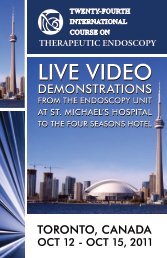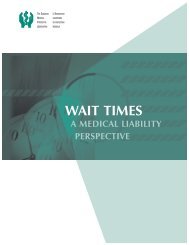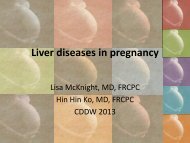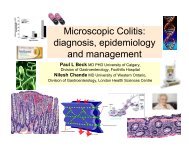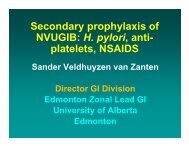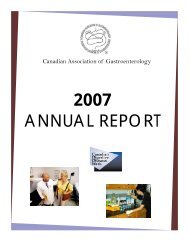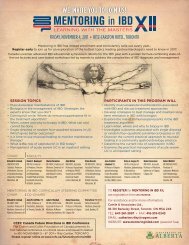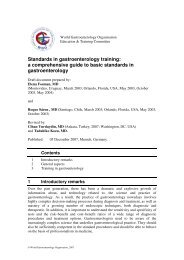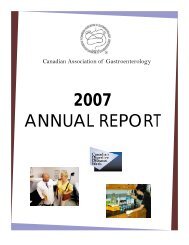SYMPOSIA: HBV AND ITS THERAPY - The Canadian Association of ...
SYMPOSIA: HBV AND ITS THERAPY - The Canadian Association of ...
SYMPOSIA: HBV AND ITS THERAPY - The Canadian Association of ...
You also want an ePaper? Increase the reach of your titles
YUMPU automatically turns print PDFs into web optimized ePapers that Google loves.
including the third annualcasl winter meetingSymposiA:Hbv AndIts <strong>The</strong>rapycanadian association for the study <strong>of</strong> the liverSunday, February 18, 20079am-10:30amFairmont Banff SpringsVan Horne A BallroomBanff, Alberta
WelcomeWelcome to the Symposia“Hepatitis B and its <strong>The</strong>rapy”<strong>The</strong>re have been recent developments in our understanding <strong>of</strong> the molecular biology <strong>of</strong><strong>HBV</strong> leading to innovations in diagnostic testing and monitoring <strong>of</strong> patients. An expert panel hasprepared a current program to link these recent advances to emerging technology to test for viralload, genotype and drug resistant mutations.As well the recent introduction in Canada <strong>of</strong> new antiviral agents to treat <strong>HBV</strong>, is changingour therapeutic approach. A summary <strong>of</strong> the recent <strong>Canadian</strong> Consensus document will be presentedand discussed.Dr. Marc Deschênes, MDsymposia: hbv and its therapy Page 1
Learning ObjectivesCo-Chair1. To understand the role <strong>of</strong> new molecular tests in managing <strong>HBV</strong> patients.Dr. Marc Deschênes, md2. To understand the role <strong>of</strong> <strong>HBV</strong> DNA monitoring in the care <strong>of</strong> <strong>HBV</strong> patients.3. To understand the newly developed <strong>Canadian</strong> treatment guidelines in relationto other published documents.Dr. Marc Deschênes, MD is the Director, Division <strong>of</strong> Hepatology, McGill UniversityHealth Centre and he is the Medical Director <strong>of</strong> Liver Transplantation. He is Assistant Pr<strong>of</strong>essor <strong>of</strong>Medicine at McGill University (Division <strong>of</strong> Gastroenterology, Department <strong>of</strong> Medicine).After graduating from McGill University, with his Doctor <strong>of</strong> Medicine and Master<strong>of</strong> Surgery (MD, CM) in 1988, Dr. Deschênes specialized in internal medicine and gastroenterology(1988-1994). He did his Hepatology Fellowship at Hôpital St-Luc – Université deMontréal (1994-1995) and then did a Liver Transplant Fellowship at the University <strong>of</strong> California,San Francisco (1995-1996).Over his career, Dr. Deschênes has be involved in clinical trials and lectured widely. He haswritten numerous scientific articles. He has participated in provincial and national working groups,special initiatives or co-chaired consensus guidelines addressing the management <strong>of</strong> patients withviral hepatitis, portal hypertension, and following liver transplantation. He is a member <strong>of</strong> ExaminationBoard in Gastroenterology, Royal College <strong>of</strong> Physician and Surgeons <strong>of</strong> Canada.In 2003 he was the Recipient <strong>of</strong> Certificate <strong>of</strong> Distinguished Service from the <strong>Canadian</strong><strong>Association</strong> for the Study <strong>of</strong> the Liver. He was elected President <strong>of</strong> the CASL for 2 years starting inthe spring <strong>of</strong> 2006.<strong>The</strong> following faculty has indicated that he does have a significant financial interest and that the content <strong>of</strong> his presentationwill not include discussion <strong>of</strong> investigative use or <strong>of</strong>f-label application <strong>of</strong> medicines, medical devices, or procedures:Faculty: Marc Deschênes Applicable Date: February 18Comment: Consultant: H<strong>of</strong>fmann-La Roche, Novartis, ScheringPage 2 canadian association for the study <strong>of</strong> the liversymposia: hbv and its therapyPage 3
Co-Chair & SpeakerSpeakerDr. Morris Sherman, mdDr. Emmet B. Keeffe, md, macpUndergraduate training - University <strong>of</strong> Witwatersrand, graduated MB BCh in 1972.Internship and residency at Baragwanath Hospital in Johannesburg and Groote SchuurHospital in Cape Town.Research training at University <strong>of</strong> Cape Town. PhD granted in 1982.Post doctoral training at Albert Einstein College <strong>of</strong> Medicine in New York 1982-1984.On staff at Toronto General Hospital since 1984, currently Associate Pr<strong>of</strong>essor<strong>of</strong> Medicine at University <strong>of</strong> Toronto.Chairman <strong>Canadian</strong> Viral Hepatitis Network, President <strong>of</strong> <strong>Canadian</strong> <strong>Association</strong> for Study<strong>of</strong> the Liver.Dr. Emmet Keeffe is Pr<strong>of</strong>essor <strong>of</strong> Medicine, Chief <strong>of</strong> Hepatology and Co-Director <strong>of</strong> theLiver Transplant Program at Stanford University Medical Centre. He obtained his MD degreefrom Creighton University and completed postgraduate training at the Oregon Health & ScienceUniversity and University <strong>of</strong> California, San Francisco. He is a past-president <strong>of</strong> the American Gastroenterological<strong>Association</strong> and the American Society for Gastrointestinal Endoscopy, and servesas a member <strong>of</strong> the Subspecialty Board on Gastroenterology for the American Board <strong>of</strong> InternalMedicine. He is a Master <strong>of</strong> the American College <strong>of</strong> Physicians and a Fellow <strong>of</strong> the American Gastroenterological<strong>Association</strong>, the American Society for Gastrointestinal Endoscopy, the AmericanCollege <strong>of</strong> Gastroenterology, and the Royal College <strong>of</strong> Physicians <strong>of</strong> Ireland. His research interestsinclude antiviral therapy <strong>of</strong> chronic hepatitis B and C, use <strong>of</strong> hepatitis vaccines, and liver transplantselection criteria and outcomes. He has published more than 500 papers, book chapters andmiscellaneous publications, and lectures widely at national and international scientific meetings,postgraduate courses, and miscellaneous educational programs.Interests in viral hepatitis and hepatocellular carcinoma.<strong>The</strong> following faculty has indicated that he does have a significant financial interest and that the content <strong>of</strong> his presentationmay/will include discussion <strong>of</strong> investigative use or <strong>of</strong>f-label application <strong>of</strong> medicines, medical devices, or procedures:Faculty: Morris Sherman Applicable Date: February 18Comment: Advisory Board: Bristol-Myers Squibb, Gilead, H<strong>of</strong>fmann-La Roche, NovartisResearch Support: H<strong>of</strong>fmann-La Roche Speaker’s Bureau: Bristol-Myers Squibb, Gilead, H<strong>of</strong>fmann-La Roche<strong>The</strong> following faculty has indicated that he does have a significant financial interest and that the content <strong>of</strong> his presentationwill not include discussion <strong>of</strong> investigative use or <strong>of</strong>f-label application <strong>of</strong> medicines, medical devices, or procedures:Faculty: Emmet Keefe Applicable Date: February 18Comment: Advisory Board/Consultant: Bristol-Myers Squibb, Gilead, GlaxoSmithKline, H<strong>of</strong>fmann-La Roche,Idenix-Novartis Research Support: H<strong>of</strong>fmann-La Roche Speaker’s Bureau: Bristol-Myers Squibb, Gilead,GlaxoSmithKline, H<strong>of</strong>fmann-La Roche, Idenix-NovartisPage 4 canadian association for the study <strong>of</strong> the liversymposia: hbv and its therapyPage 5
SpeakerAbstractDr. Mel Krajden md, frcp(c)Dr. Morris Sherman, mdAs Associate Director, BCCDC Laboratory Services Dr. Krajden’s research focus involvesthe molecular diagnosis <strong>of</strong> viruses, the assessment <strong>of</strong> correlates between infection and clinicaldisease, using molecular markers to monitor anti-viral efficacy in vivo, and the use <strong>of</strong> moleculartechniques (pathogen fingerprinting) to track microbial agents for epidemiological purposes. Hehas particular expertise in quantitative nucleic acid testing <strong>of</strong> cytomegalovirus, hepatitis B and Cviruses and inter-assay evaluation. He has also published in the fields <strong>of</strong> nucleic acid based detection<strong>of</strong> both hepatitis B and C viruses. Since Jan 2001, he has served as the Director, HepatitisServices. This provincial program is focused on the integration <strong>of</strong> hepatitis prevention and careservices in BC. In partnership with <strong>Canadian</strong> Blood Services, the Provincial Blood CoordinatingOffice and the BCCDC, Dr. Krajden has also been instrumental in initiating an Anonymized DataLinkage Project: Application <strong>of</strong> Privacy Enhancing Technologies to Enhance Public Health andBlood Safety.<strong>The</strong>re have been major changes in the understanding <strong>of</strong> the natural history <strong>of</strong> chronic hepatitis B over thelast 2-3 years. In addition, several new antiviral agents have become available that are able to suppress viral replicationmore potently and with less resistance than lamivudine. As a result, the approach to the management <strong>of</strong> hepatitis B haschanged dramatically and fairly suddenly. In order to determine best practices the <strong>Canadian</strong> <strong>Association</strong> for Study <strong>of</strong>the Liver held a consensus conference in January 2007. A consensus document is being prepared. This represents a draftversion <strong>of</strong> the consensus document. This abstract will only highlight some <strong>of</strong> the recommendations.1. Normal ALT is not a reason to deny patients treatment if the viral load is high and a biopsy showsevidence <strong>of</strong> significant disease.2. <strong>HBV</strong> DNA is the main (but not the only) determinant <strong>of</strong> treatment, not ALT.3. HBeAg seroconversion cannot be taken as evidence <strong>of</strong> permanent inactivation <strong>of</strong> disease. All patientswho have undergone HBeAg seroconversion must continue to be followed regularly.4. Lamivudine remains a treatment option. Although all the other agents have advantages over lamivudinein terms <strong>of</strong> potency and lower rates <strong>of</strong> resistance, lamivudine remains an acceptable alternative simplybecause <strong>of</strong> cost.5. To minimize the possibility <strong>of</strong> resistance developing patients with high viral loads should be treatedwith more potent agents. Patients receiving lamivudine, adefovir or telbivudine should have treatmentregimens changed if suppression <strong>of</strong> virus is inadequate by 24-52 weeks.6. Lamivudine resistance should be detected early by following patients at 3 monthly intervals with <strong>HBV</strong>DNA. A rise in viral load precedes a rise in ALT. By the time that ALT rises the viral load is usually high,reducing the efficacy <strong>of</strong> the second line agent.7. Lamivudine resistance should be treated by addition <strong>of</strong> adefovir.<strong>The</strong> following faculty has indicated that he does have a significant financial interest:Additional recommendations will be discussed during the presentation.Faculty: Mel Krajden Applicable Date: February 18Comment: Advisory Board: Gilead, H<strong>of</strong>fmann-La Roche Educational Support: H<strong>of</strong>fmann-La Roche, ScheringResearch Support: H<strong>of</strong>fmann-La Roche, ScheringPage 6 canadian association for the study <strong>of</strong> the liversymposia: hbv and its therapyPage 7
NotesAbstractDr. Morris Sherman, mdDr. Emmet B. Keeffe, md, macp. Chronic hepatitis B is diagnosed in patients with elevated alanine aminotransferase (ALT) levels, high<strong>HBV</strong> DNA levels (defined below), and necroinflammation on liver biopsy.. <strong>The</strong> natural history <strong>of</strong> <strong>HBV</strong> infection can be divided into 4 phases: immune tolerant, immune clearance(HBeAg-positive chronic hepatitis B), non-replicative (inactive HBsAg carrier), and reactivation. (HBeAg-negative chronic hepatitis B).Treatment is currently recommended for patients in the immune clearance and reactivation phasesthose. with HBeAg-positive or HBeAg-negative chronic hepatitis B.ALT criteria used for determining the indications for therapy should be the revised upper limits <strong>of</strong>. normal, i.e., 19 U/L in women and 30 U/L in men.<strong>The</strong> primary goal <strong>of</strong> therapy for chronic hepatitis B is long-term suppression <strong>of</strong> serum <strong>HBV</strong> DNA,. which will likely reduce progression to cirrhosis and HCC.<strong>The</strong> FDA-approved therapies for chronic hepatitis B include interferon alfa-2b (1991), lamivudine. (1998), adefovir (2002), entecavir (2005), peginterferon alfa-2a (2005), and telbivudine (2006).<strong>The</strong> currently preferred treatments include adefovir, entecavir, telbivudine, and peginterferon alfa-2a;standard interferon alfa-2b has been replaced by peginterferon alfa-2a, and lamivudine is not a preferred. first-line drug due to high rates <strong>of</strong> resistance.HBeAg-positive chronic hepatitis B patients should receive treatment when serum <strong>HBV</strong> DNA levels are. ≥ 20,000 IU/mL and ALT levels are elevated, particularly ≥2-fold.HBeAg-negative chronic hepatitis B patients should receive treatment when serum <strong>HBV</strong> DNA levels. are ≥ 2,000 IU/mL and ALT levels are elevated.Patients considering peginterferon alfa-2a therapy should be tested for <strong>HBV</strong> genotype; genotype Aresponds much better than genotype D (both common in Caucasians), and genotype B responds somewhatbetter than genotype C (both common in Asians).. All patients with chronic hepatitis B and cirrhosis with <strong>HBV</strong> DNA levels ≥ 2,000 IU/mL should betreated. <strong>The</strong>re is increasing evidence supporting the use <strong>of</strong> combination nucleoside/nucleotide agentsin these patients, and therapy should probably be long-term for both HBeAg-positive and HBeAg-negative patients.Page 8 canadian association for the study <strong>of</strong> the liversymposia: hbv and its therapyPage 9
AbstractNotesContinuedDr. Emmet B. Keeffe, md, macp. <strong>The</strong> rates <strong>of</strong> resistance with long-term therapy are high with lamivudine (65-70% at 4-5 years),intermediate with adefovir (29% at 5 years <strong>of</strong> therapy) and telbivudine (21.6% in HBeAg-positive and8.6% in HBeAg-negative patients), and low with entecavir in the absence <strong>of</strong> prior lamivudine resistance(1.1% after 4 years <strong>of</strong> therapy). Patients with lamivudine resistance have a 32% rate <strong>of</strong> novel mutationsafter 3 years <strong>of</strong> entecavir therapy. Resistance does not occur with interferon or peginterferon therapy.. Serum <strong>HBV</strong> DNA should be monitored every 3 to 6 months to confirm initial response to treatment(>1 log10 copies/mL decreases from baseline) at week 12, ensure adequate suppression after 24 weeks<strong>of</strong> therapy (1 log10 copies/mL from nadir value on treatment) during long-term treatment.. On-treatment monitoring strategies to define early virologic responses that are predictive <strong>of</strong> betteroutcomes and a reduced risk <strong>of</strong> viral resistance have been recently proposed (roadmap concept).Measurement <strong>of</strong> the absolute level <strong>of</strong> <strong>HBV</strong> DNA level at week 24 is considered essential in the roadmapconcept, and virologic responses at this time point are categorized as complete, partial, or inadequate.Complete virologic response is defined as negative <strong>HBV</strong> DNA (
NotesDr. Mel Krajden md, frcp(c)Page 12canadian association for the study <strong>of</strong> the liver
This program has been submitted for Category 1 accreditation under the Royal College<strong>of</strong> Physicians and Surgeons <strong>of</strong> Canada Maintenance <strong>of</strong> Certification Program by the <strong>Canadian</strong> <strong>Association</strong> <strong>of</strong> Gastroenterology.Sponsored by an Educational Grant from H<strong>of</strong>fmann-La Roche Limited



